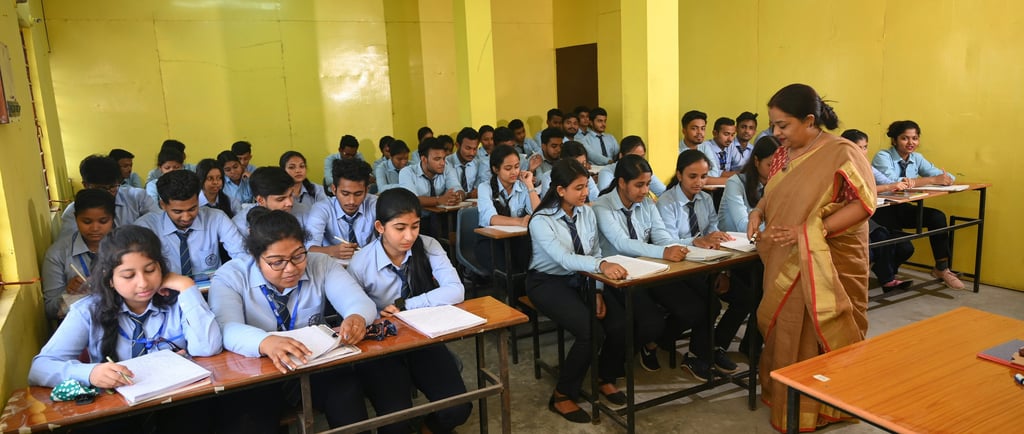🌟 NATIONAL EDUCATION POLICY NEP 2020 & CBSE Curriculum Reboot: A Deep Dive into New Textbooks and Policy Changes
Explore the latest updates on India’s NATIONAL EDUCATION POLICY NEP 2020 and CBSE curriculum reforms, including newly introduced NCERT textbooks, activity-based learning, and mother-tongue instruction. Understand textbook changes, class-wise rollouts, and assessment reforms shaping the future of Indian education.
Simran
7/15/20253 min read


The National Education Policy (NEP) 2020, approved by the Union Cabinet on July 29, 2020, ushers in a transformative educational paradigm in India ABP LiveWikipedia. The policy introduces a new 5+3+3+4 structure, centers on activity-based and competency-driven pedagogy, and promotes mother-tongue instruction up to Grade 5 (and ideally until Grade 8) Wikipedia+1The Times of India+1.
🧭 NEP 2020 Key Pillars
Foundational Literacy & Numeracy by Grade 3 via the NIPUN Bharat mission.
Activity-based and experiential learning, focusing on holistic development over rote memorization.
Flexible, multidisciplinary curricula, incorporating vocational and traditional knowledge systems (IKS).
Medium of instruction in a child’s home language until foundational competence is achieved Shikshapress+1The Times of India+1The Times of India.
These principles are being actively integrated into the Central Board of Secondary Education (CBSE) framework and NCERT textbooks from Classes 1 to 12.
📘 New NCERT & CBSE Books Aligned with NEP
Classes 1–2 (Bal Vatika & Std I)
NCERT released refreshed activity-rich textbooks for Classes 1 and 2 in early 2024. These integrate storytelling, puzzles, songs, and culturally relevant contexts, aiming to foster communication skills and emotional development Education Times+15The Hindu+15ABP Live+15.
Classes 3 & 6 (2024–25)
For the 2024–25 academic year, NEP-aligned textbooks were rolled out for Classes 3 and 6, featuring new curriculum content:
Class 3: Introduction of Physical Education, Art Education, and World Around Us, promoting holistic skills The Indian Express+7Education Times+7The Times of India+7.
Class 6: New bridge courses in April 2024, followed by new textbooks in May, including puzzles, experiments, and vocabulary exercises Shikshapress.
Classes 4, 5, 7 & 8 (2025–26)
From April 2025, CBSE and NCERT are launching competency-based textbooks for Classes 4, 5, 7, and 8 The Times of India+12Bureau of Investment+12ABP Live+12. These books emphasize real-life cases, interactive diagrams, and local cultural knowledge.
Class 9 & 10 (2026 onward)
In a major step, CBSE will introduce two-tier difficulty levels (Standard & Advanced) in Science and Social Science for Class 9 beginning 2026, with advanced-level supplements in new NCERT textbooks; first board exams under this system will be in 2028 The Times of India+1The Times of India+1ABP Live.
Furthermore, Class 10 Geography and other subjects feature reduced content volume with enhanced skills and map-based questions, with subject rationalization following NEP principles Education Post+1The Times of India+1.
📚 Highlights of New Book Features
Storytelling, puzzles, songs integrated into Marathi, English, Mathematics (e.g., Std I Maharashtra model) The Times of India.
Vocational and traditional knowledge, including Indian Knowledge Systems (IKS) examples across science and social science Wikipedia+1The Times of India+1.
Bridge courses: 15–45 days before sessions for Classes 5, 7, 8, and Class 6 in 2024—designed to ease transitions to new curricular frameworks Shikshapress+1The Times of India+1.
Digital availability: PDFs on NCERT portal, DIKSHA, and ePathshala Education Post+1reddit.com+1.
⚠️ Implementation Challenges
Textbook shortages: As of mid-July 2025, Chandigarh government schools lacked updated NCERT books for Classes V and VIII, particularly in Math, EVS, Science, and Hindi The Times of India+3The Hindu+3The Times of India+3.
Language-policy concerns: The transition to mother-tongue instruction from 2025–26 has sparked debates—supporters highlight improved learning, but critics fear inequity in English-language access The Times of India+1The Economic Times+1.
🚀 CBSE Initiatives & Supporting Programs
Mother-Tongue First: From the 2025–26 school year, CBSE is implementing mother-tongue instruction in foundational/preparatory stages in line with NCF-2023 The Times of India+1The Economic Times+1.
Bharatiya Bhasha Summer Camps (BBSC): Held May 2025—28‑hour courses in 22 Indian languages, complete with cultural immersion and performances The Times of India.
Bridge courses: To smooth curriculum changes for Classes 4–8 from 2025, featuring recap modules focused on concept clarity and experiential learning Shikshapress+2Asha Modern School+2The Times of India+2.
🧠 Assessment & Pedagogy Reforms
Class 11 & 12: Increased competency-based questions (MCQs, case-based) from 40% to 50%, and reduced open‑ended questions to 30% as of 2024–25 Education Post.
Holistic Progress Card: Drafted for Classes 3–5 as part of NEP’s holistic evaluation model, considering emotional, social, and academic growth through public consultation starting July 15, 2025 The Times of India.
Board exam structure: Two attempts per year, objective plus descriptive mode, aligned to PARAKH standards Wikipedia.
✅ Summary & Forward Look
India’s NEP 2020 is reshaping foundational through secondary education with story-based activity books, competency frameworks, and multilingual teaching. While rollouts proceed class-by-class, challenges like book supply delays, language equity concerns, and effective teacher training remain key. The public feedback process, bridge courses, and digital availability reflect a collaborative, thoughtful implemen
Ministry of Education / NCERT PDF on NEP 2020
CBSE circulars on two-tier exams & mother-tongue instruction
Times of India coverage on textbook delays and camps
ABP Live on advanced-level textbooks
#NEP2020 #CBSETextbooks #CompetencyBasedLearning #MotherTongueEducation #NEPHolisticAssessment #BharatiyaBhashaCamps